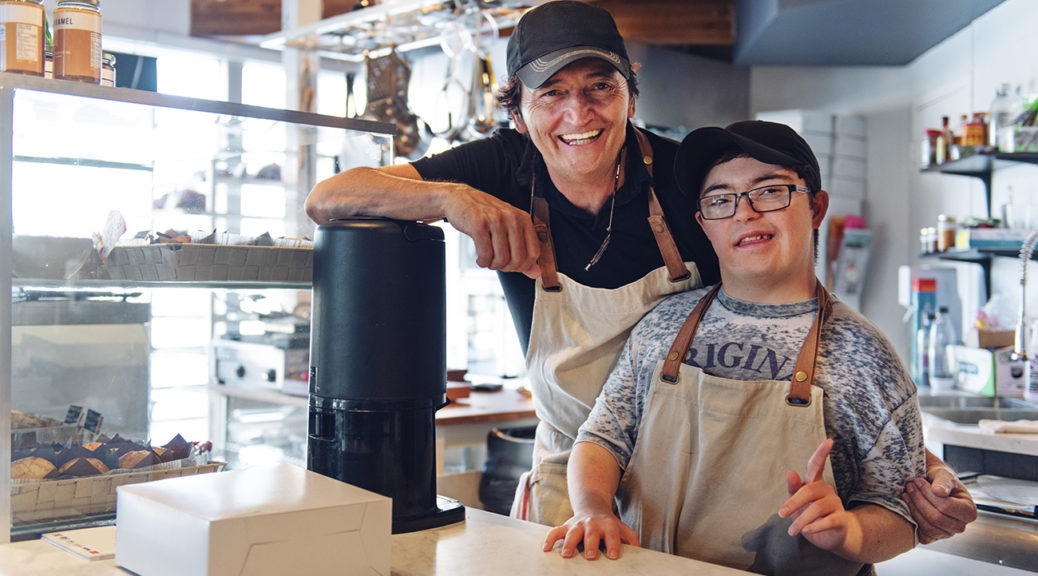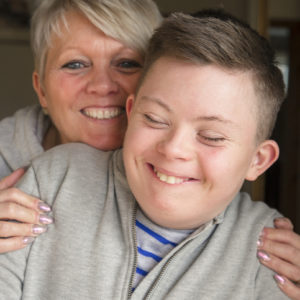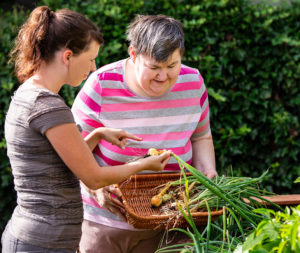What is Shared Living?

At KVC Nebraska, we’re proud to offer Shared Living services where people with developmental, intellectual or other disabilities can experience a safe, nurturing living environment in order to thrive more independently. Shared Living providers open their homes to clients who want a comfortable place to call home where they can learn essential social and living skills while receiving the care they need and forming beneficial relationships. Typically, clients move out of their family homes and into a Shared Living provider’s home because they want to experience life as an adult living away from their parents.

Sarah Nixon, Administrative Supervisor of Developmental Disability Services
“Shared Living is really important, not just for KVC, but for our communities and the state of Nebraska as a whole,” said Sarah Nixon, KVC Nebraska Administrative Supervisor of Developmental Disability Services. “Shared Living can prevent people from being institutionalized. Clients receiving Shared Living services enjoy a family environment where they’re able to grow and experience a more independent life.”
Sarah oversees Shared Living providers and ensures developmental disability clients have all the support and resources they need. As an advocate for Shared Living, Sarah has even welcomed clients into her home and served as a provider in the past.
Because of Shared Living settings, people with developmental or intellectual disabilities can live and learn in the home through daily educational programs. As providers offer a living space for people with disabilities, they can help their clients learn coping skills, take care of hygiene or understand how to build strong relationships.
Sign up for more information about becoming a Shared Living provider today.
What Does It Mean To Be a Shared Living Provider?
Shared Living providers offer individuals with developmental and/or intellectual disabilities 24/7 intensive social and independent living skills training in a family setting. Clients help determine their own goals for habilitation and independence. Additionally, individuals receiving Shared Living services may have a mental health diagnosis and/or severe behavioral impairments that need to be addressed through therapy, behavioral management strategies, or other means that the team deems necessary.
Shared Living clients typically stay in one home long-term which allows them to build a connection with their provider. They become a family. Also, with certain disabilities, clients can be very specific about how they like things done. With Shared Living services, the provider gets to know these specifications and can keep care consistent and customized for the client.
Who makes a good Shared Living provider? KVC Nebraska is always in need of individuals or families interested in becoming Shared Living providers. Households that include someone with medical training can be particularly helpful. However, a willingness to learn is the most essential qualification. When most family members are willing to learn about caring for those with developmental or intellectual disabilities, partnering with KVC Nebraska to create a positive environment can be a fantastic experience.
Requirements to be considered as a Shared Living provider include:
 Must be 21 years of age or older
Must be 21 years of age or older- Have a valid driver’s license and/or reliable transportation
- Willingness for everyone in your household to undergo complete background checks
- Complete KVC’s Shared Living training (including CPR/First Aid, MANDT and Medication Aide)
- Meet all applicable regulations through the Department of Health and Human Services
How long does it take to become a Shared Living provider? The timeline is flexible and depends on how long the potential provider chooses to take to complete the program. On average, this takes about six months. Once potential providers complete the 13 online training sessions and file the required paperwork, KVC Nebraska finishes with a background check. Get more details about the process here.
What does it cost to become a Shared Living provider? Material training costs come in at just under $100, a fee that providers pay upfront, but it is refunded when a provider becomes certified. Shared Living providers receive reimbursement for habilitation, supervision and support with clients in care. The amount of this reimbursement depends on the intensity and severity of care.
Although the process may sound rigorous, it’s vital to ensure that clients receive top-notch care. KVC Nebraska welcomes providers interested in offering long-term care.
Who Qualifies As a Shared Living Client?
Shared Living clients are individuals with developmental or intellectual disabilities who want to gain more independent living skills. Shared Living clients range across many ages, from children through adults in their 70s.

KVC Nebraska may work in conjunction with foster care to take in children who are part of child and family services. “That’s really nice because it means kids in foster care can potentially live with the same family their entire lives,” Sarah notes. “Shared Living is intended to be long-term care.”
Shared Living clients typically are connected via the Nebraska Department of Health and Human Services (DHHS), the Nebraska Division of Developmental Disabilities Services (DD Services) or the Nebraska Division of Child and Family Services. Often, clients within the Child and Family Services umbrella age out of foster care and shift into DD Services.
But the waitlist for clients needing Shared Living services is very long, unfortunately: People in need of care can sometimes wait upwards of several years. And that’s why the need for more Shared Living Providers is critical. Sign up for more info on becoming a Shared Living provider.
Why Should I Become a Shared Living Provider with KVC Nebraska?
At KVC Nebraska, we believe we all need connection. We serve more than a thousand children, families and adults every year. So, within KVC Nebraska, you’ll find an entire health system behind you when participating in our Shared Living program.
“We have all the features necessary to run an effective program,” Sarah relates. This includes payroll, legal consult and lawyers, plus the backing of an extensive, established and multi-faceted health system. KVC Nebraska is proud of its ability to meet rigorous standards, which results in the best experience possible for clients and providers.
 When partnered with KVC Nebraska, Shared Living providers have a solid program behind them. Additionally, providers point to KVC Nebraska’s reputation in the community. With practiced attention to ethics, the KVC Nebraska team will always do what’s right for Shared Living providers and clients. See why experienced KVC Nebraska Shared Living providers, Suzan and Mike, love providing direct, full-time care to individuals with disabilities here.
When partnered with KVC Nebraska, Shared Living providers have a solid program behind them. Additionally, providers point to KVC Nebraska’s reputation in the community. With practiced attention to ethics, the KVC Nebraska team will always do what’s right for Shared Living providers and clients. See why experienced KVC Nebraska Shared Living providers, Suzan and Mike, love providing direct, full-time care to individuals with disabilities here.
Those participating in the Shared Living program also enjoy 24/7, on-demand support from a nurse and assigned specialist. Providers can get immediate support from these experts for issues of any kind, just a phone call away. Also, providers will receive coaching to work through potential crisis behaviors.
Around-the-clock care may seem daunting. But providers have options when they need a break — and KVC offers individualized support. If there are times the provider is unable to care for the client in their home, alternate care offers a short-term break. Alternate care can be arranged if the provider is going out of town, has personal matters to take care of or simply needs a break for self-care. KVC can help providers connect to these alternate care options.
How Do These Services Impact Clients and Providers?
 The most significant impact of the Shared Living program is creating a family environment for those in need. “We like our clients to be involved in social events and out in the community,” Sarah said. “For example, going together to the grocery store where you talk about different food options and the cost of items.” Shared Living providers should always strive to demonstrate skills and abilities that will help clients become more independent in the future.
The most significant impact of the Shared Living program is creating a family environment for those in need. “We like our clients to be involved in social events and out in the community,” Sarah said. “For example, going together to the grocery store where you talk about different food options and the cost of items.” Shared Living providers should always strive to demonstrate skills and abilities that will help clients become more independent in the future.
Reflecting on her own time as a Shared Living provider, Sarah found the experience genuinely fulfilling. “It gives you a greater sense of purpose,” she says. “Also, you’re learning from them, too! We learn about ourselves through the way we interact with them. We learn about ourselves through the way we go through a crisis with them. They’re fun to be around. So it really is companionship on both sides of the coin.”
Get answers to more frequently asked questions here.
How Do I Become a Shared Living Provider?
You can begin the process of becoming a Shared Living provider by starting the application process with KVC Nebraska. Through the application, you’ll find all the information you’ll need. Once the application has gone through the system, our team will screen your application. After that, a KVC team member will connect with you if you’re qualified to become a Shared Living provider. Why wait? Start your application here and you’ll be on your way to making a difference in someone’s life today.